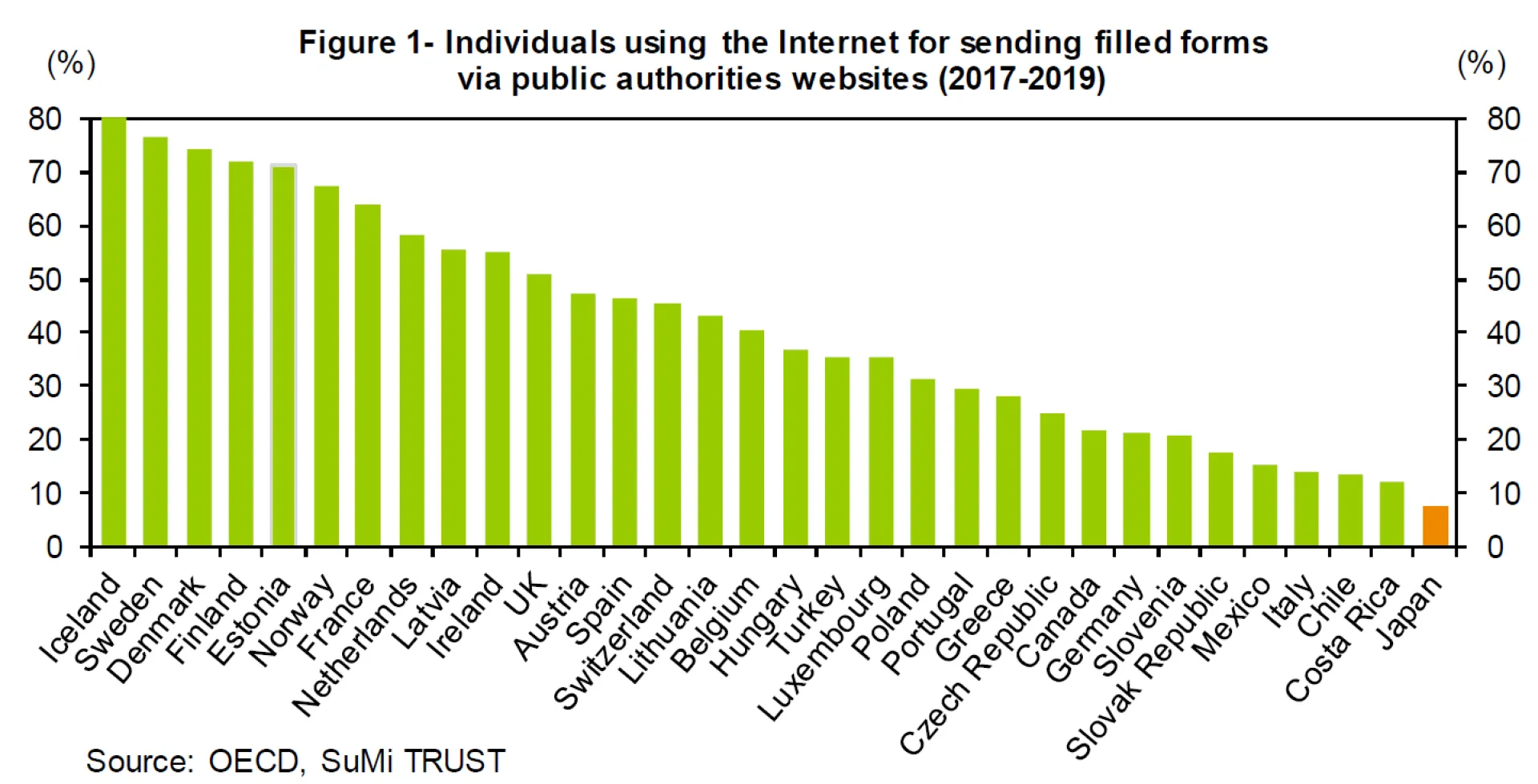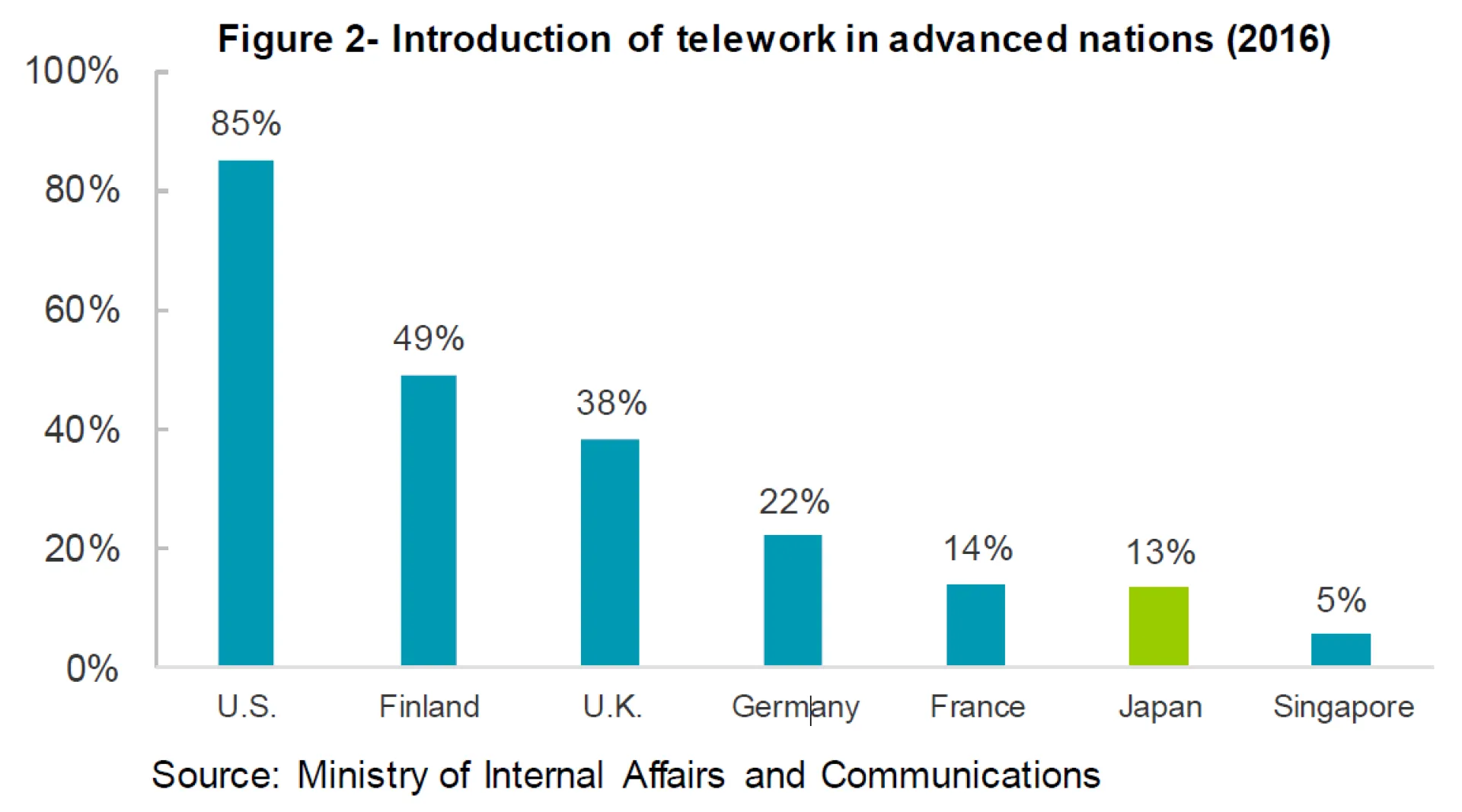Promotion of digitalization is required to preserve the wealth of the Japanese economy
Japan faces an aging and shrinking population and its potential growth rate is just over 0%. In addition to welcoming immigrants to maintain a labor force, it must preserve its economic wealth and raise the potential growth rate by improving the efficient of the economy by promoting digitalization through innovation. Digitalization is the pillar of “Suganomics”. In this report, I will discuss the current status and issues of digitalization in Japan from the standpoint of: (1) the government, (2) private enterprises, (3) healthcare, and (4) schools.
(1) Digitalization of the Government
Japan has fallen behind in the digitalization of its government. According to the OECD, only 7.3% of individuals in Japan have used electronic applications for government services in the past year, the lowest among about 40 countries (Figure 1) It is fresh in our memory that the safety net procedures such as employment and rent subsidies and uniform cash payments for residents were significantly delayed compared to other developed countries due to lack of digital infrastructure. In Japan, the penetration rate of My Number Card (an identity number card for individuals) is still low at just under 20%, without which application for administrative services would be done by post, which is complicated and inefficient. In addition, many cases of inadequacy of the application system and systems breakdown have been reported, revealing Japan’s big problem in the usability of the administrative electronic infrastructure. Also, before COVID-19, the stamp culture had taken root in government offices, and the approval process would not have been possible without the use of paper and stamps.

However, while COVID-19 has restricted face-to-face activities, the government has supported the move away from the use of stamps, and government offices are now reviewing this. Prime Minister Suga is radically reviewing the use of documents, stamps, and face-to-face principles in administrative procedures. Furthermore, with the aim of getting every citizen to obtain an My Number Card by April 2023, the government is promoting the digitalization of administrative services.
Speed has always been an issue for Japanese government office work, but in preparation for the establishment of the "Digital Agency" in 2021, we believe that digitalization of the government will happen very quickly as Prime Minister Suga, who is known for his ability to execute, takes a top-down approach to the matter. Acceleration of a government-led move to digitization will be needed to further encourage investment in ICT (Information and Communication Technology) in the private sector and to boost digital literacy.
(2) Digitalization of Private Enterprises
The digitalization of private enterprises has also fallen behind considerably. Japan has a fairly low penetration rate of remote work (or telecommuting) among developed countries (Figure 2) In Japanese society, going to work has been regarded as a virtue, the IT infrastructure of private companies is generally fragile and backward, and paper-based approval using stamps has become a common practice. The fact that there has been no alternative but to do so has also hindered the penetration of remote work.

However, while COVID-19 imposes restrictions on going to work, remote work is gradually spreading at some large companies. Furthermore, the movement to abolish the use of stamps in companies has become more common. We at SuMi TAM have been developing an infrastructure for remote work for some time, but due to COVID-19, the move to introduce and institutionalize remote work has accelerated, and work is performed from outside the office in almost all positions. It has now become possible to complete the settlement process electronically. Hitachi, a giant in the Japanese heavy industry, has also announced a policy to make remote work a permanent feature in the wake of COVID-19, and also announced that it will completely abolish the use of stamps by the end of FY2021. Although the government has supported the move away from stamps, and a review is underway under the initiative of government agencies, it has gradually become widespread in private companies. As of the July-September 2020 quarter, sales of the e- signature business at the electronic contract service, "Cloud Sign", operated by Bengo4.com were 2.5 times higher than the same period of the previous year and 1.3 times higher than the previous quarter due to the movement away from using stamps.
According to the results of an analysis by the Ministry of Internal Affairs and Communications of Japan comparing companies that use ICT with those that do not, the labor productivity of companies that have introduced remote work is on average about 60% higher than that of companies that have not. Although there are some issues in labor management and security measures associated with the introduction of remote work, electronic contract services will become widespread in the future, and the inefficient Hanko (stamp) culture will decline, resulting in flexible work styles (e.g. remote work) It is expected that the productivity of private companies will improve as it becomes more widespread.
(3) Digitalization of Healthcare
Japan is also far behind other developed nations in the digitization of medical care. The utilization rate of online medical care in Japan is considerably lower among developed countries, which was only about 1% before COVID-19. On the other hand, in the United States, the HITECH Act was enacted in 2009 as a measure to promote medical IT after the global financial crisis in 2008, and online medical care has begun to spread rapidly. The utilization rate of online medical care in 2019 was about 10%. In China, the usage of online medical care in 2019 was as high as 24%, and a series of services from AI interview, medical treatment and consultation by doctors, prescription and drug delivery are provided 24 hours a day.
Due to COVID-19 pandemic, even in Japan, the digitalization of medical care such as online medical care is gradually getting popular. In April 2020, online medical care, including the first visit, was permitted as a time- limited special measure for COVID-19. As many patients are afraid of becoming infected by COVID-19 from outpatient visits, the number of medical institutions that are introducing online medical care is increasing rapidly. In Japan, the Medley service, "CLINICS", is leading the way as a pioneer in online medical care, but competition is intensifying with M3, which is famous for medical information services, making a full-scale entry into online medical care services. Although the Japan Medical Association has expressed caution, Prime Minister Suga has instructed making online medical care permanent, and further digitalization of medical care is awaiting.
However, the reality is that there are still issues in the expansion of online medical care. The current medical fee structure is such that medical institutions encourage patients to visit the hospital and receive more fees as the number of outpatients increases. Thus, there must be change to a more attractive fee structure for online medical services in the future.
In addition, while online medical care in Japan is centered on the introduction of IT systems, the US and China rely not only on systems but match doctors with patients and provide menus such as consultation recommendations and health support. In Japan, it will be possible to expand the business in the market penetration phase, but in order to establish online medical care and create markets in the medium to long term, it is essential for Japanese businesses to establish a model as a service provider.
(4) Digitalization of Schools
Digitalization of schools is also a major issue in Japan. According to the OECD Program for International Student Assessment “ICT Utilization Survey”, time spent using digital equipment in classrooms by students per week was a mere 14% for language classes (OECD average 44.5%), 8% for mathematics (OECD average 38%), and 19% for science (OECD average 47%). According to a survey on the “use of computers at school with other students”, about 90% of students in Japan responded “almost never", and about 10% said they use it once or twice a month, which are the lowest among OECD members. Furthermore, the school Wifi penetration rate in 2015 was 26% in Japan, 88% in the US, and 78% in the UK.
However, even in Japan, digitalization of schools is accelerating due to COVID-19. While face-to-face teaching were hindered by the pandemic, online classes were introduced in some private schools. In addition, Benesse, a major education service provider, has begun to focus on school services as an important business in addition to traditional tutoring schools and distance learning. Specifically, as support for the introduction of ICT, it has begun full-scale development of services that support the creation of personalized teaching materials and lesson design that meet the needs of teachers.
Although there are issues in the digitalization of schools in that there are disparities in the development of school ICT environments among local governments, the government has begun to take the initiative in correcting the disparities. Under the GIGA school concept proposed by the Ministry of Education, Culture, Sports, Science and Technology in December 2019, each student nationwide will be provided with a PC terminal, a high-speed, large-capacity communication network will be built, and education will be individually optimized through online education. As of March 2019, the number of children per educational PC was 5.4 and the classroom wireless LAN rate was 41%. The goal is to raise this to a PC per every three children and a 100% wireless LAN rate by the end of FY2022. Furthermore, the government will take the initiative in institutionalizing digital textbooks in elementary, junior high and senior high schools, and promote the utilization of learning data. Prime Minister Suga has stated that he will focus on promoting online education, and thus the potential market for school digitalization is very large.
Effective utilization of intangible assets is important in a digital society in the medium to long term
As mentioned above, the transition to a digital society under Prime Minister Suga is the most important mission that will determine Japan's future, as it will improve the efficiency of the economy as a whole and lead to an increase in the potential growth rate. In the short term, infrastructure development for a digital society led by the government will be an issue, but in the medium to long term, efficient accumulation of intangible assets such as data and AI algorithms will be the key to operating an advanced digital society. In the US, as a result of accumulating investments in intangible assets such as software, the business of creating value with intangible assets such as GAFA has expanded. Japan will also be required to make effective use of intangible assets in order to join the ranks of advanced digital nations.
